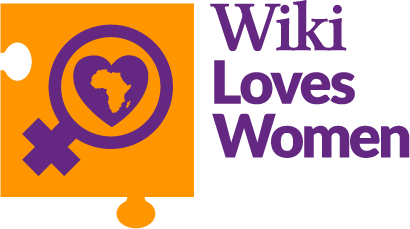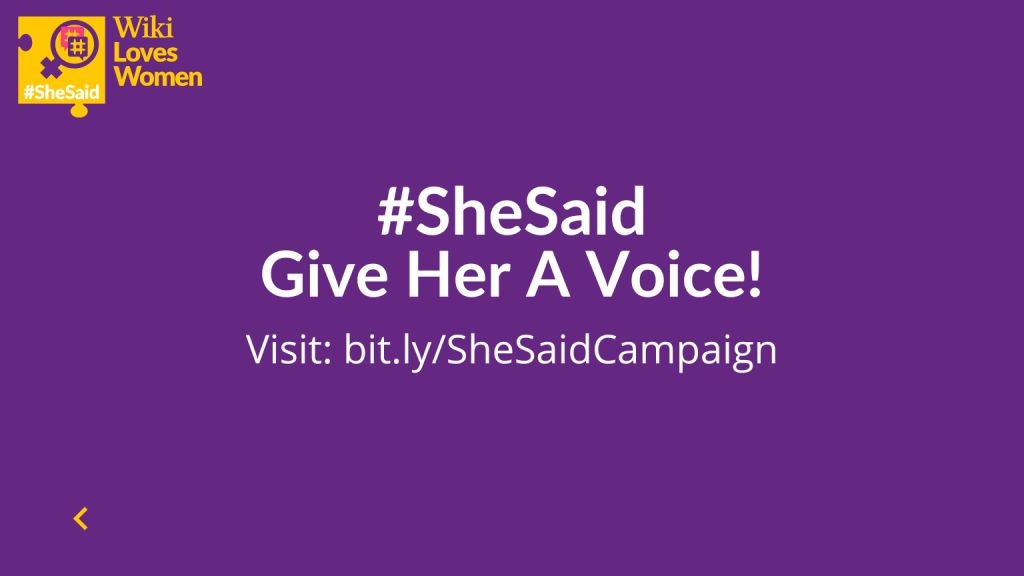As we continue to highlight the inspiring individuals behind the #SheSaid campaign, we’re excited to connect with local organizers and key community members. This time, we’re thrilled to interview Bashir from Nigeria, who is taking the lead in organizing the #SheSaid campaign for the second consecutive year. Join us as we delve into his experiences, insights, and the impact of this initiative.
Could you tell us about yourself?
I am an active editor and administrator on Hausa Wikipedia with more than 25,000 edits. I am also active on English Wikipedia, much of my experience on New Page Patrolling (currently a New Page Patrol School Student). I have access to tools necessary for reviewing new pages on English Wikipedia. I also focus on filling the gender gap on Wikimedia. I have organized several successful campaigns (especially Wiki Loves Women #SheSaid) for bridging the gender gap and averting gender bias on and off Wikimedia. I created awareness, trained, and inspired women and other genders to join the Wikimedia movement.
“I believe Wikimedia and the world at large is meant not only for the dominance of a single gender.”
Both genders are created to live equally. My mission aligns with Wikimedia’s vision, which is that every person can share in the sum of all knowledge freely, regardless of gender difference, color, religion, or ethnicity. When selected, I will channel all my efforts toward achieving this goal.
Since joining Wikimedia in late 2019, I have contributed randomly without a specific direction and goal. However, I found my purpose recently; after organizing the #SheSaid campaign in Northern Nigeria. I see a lot of enthusiasm from the women like never before from our male participants (even though most of them are elderly – 25 years and above). The readiness to learn, the zeal to contribute, the pride of being involved.
I have administrative skills in tackling vandalism, creating guidance and motivation, inspiring contribution and inclusion, etc. I also have experience in public speech, newbie training, and event organization. I also have extensive knowledge of Wikimedia policies and guidelines. I am the founder and chairman of a newly created user group focusing on equality and reaching minorities in Northern Nigeria (currently under review process). I am also a photographer by profession (therefore, I can volunteer to cover event pictures and videos)
After your first year as an organizer, what inspired you to take on the role again?
After organizing my first event, I realized that my community needs the #SheSaid campaign more than any other. Many traditional beliefs can hinder the participation of women in Wikimedia activities. Another factor is the misinterpretation of religious teachings by some local scholars which also serves as a major barrier for the participation of women in educational programmes. Another issue is the lack of awareness in many remote areas, especially in Northern Nigeria. Plus, after organizing the #SheSaid campaign in Northern Nigeria. I see a lot of enthusiasm from the women like never before from our male participants (even though most of them are elderly – 30 years and above). The readiness to learn, the zeal to contribute, the pride of being involved. This spurs me to think further about organizing a larger campaign to reach many more audiences and enlighten women on how to amplify their voices through Wikiquote.
What aspect of the event/s are you most proud of?
First and foremost, I am always proud of being part of the Wikimedia Community. Like I said, it’s one of the best experiences in my life. As for the #SheSaid campaign, I am proud of being the one who enlightens and engages women from my local community to this beautiful movement. I am most proud of being the trainer, the disseminator of knowledge and being the one who fills in the gender gap in Northern Nigeria. Like it says: “the best among you are those who learn and teach others”; I am grateful for the experience, the things I learned in the process of teaching others and the little mistakes during the process of organizing these events. I am proud to have been part of the Wiki Loves Women #SheSaid organizers and I am looking forward to the future achievements of this campaign.
How important do you think #SheSaid is in addressing the gender gap on Wikiquote, especially now that you’ve been involved for two years?
I found the #SheSaid campaign to be one of the best mediums for addressing gender inequality on Wiki. Its objectives are clear, and its vision is direct and effective. Most of our local participants found it easier to relate to the goals and mission of the #SheSaid Campaign than any other campaign I have organized before. Plus, Wikiquote is relatively easy, quotations are easy to cite and the guidelines are relatively easier and less complex to understand than Wikipedia. The title of the campaign “Wiki Loves Women #SheSaid” is so appealing to women that they got excited to know what the campaign entails and eager to join and learn how to contribute. A campaign of the women, by the women and for the women.
What have you learned from your first year that you’ve applied this time around?
I have learned many things from my first campaign, but the most important thing is I found the #SheSaid campaign to be the most suitable avenue for filling the gender gap in my community. I learned that there is a big gap among editors of Wikimedia projects in my community and the number of articles alike. I realize that we need the #SheSaid campaign just like any other community facing gender imbalance and inequality. This spurs me to think further about cultivating a strong impact across Hausa communities.
What strategies have you found most effective in encouraging community participation, particularly for the second year?
We have developed many new strategies for encouraging participation but the most important ones are:
- Entertainment: We tried to make the campaign as lively as possible. We develop funny examples to explain some terminologies. For example, when explaining notability, I gave an example that I can not write an article about myself (or my family member like my dad) just because I think I/he is great. There are some guidelines that I have to follow before creating my article as a stand-alone Biography, like being cited by an Independent reliable source e.g. newspaper, magazine, etc. (that is: General Notability Guidelines). Unless when I become a governor (Specific Notability Guideline). Even so, I cannot write the article myself as I may be biased in some aspects (that is; Conflict of Interest). And most importantly I cannot charge some or collect money for the purpose of editing or creating articles about someone (that is Paid Editing), among many other examples.
- Continuous motivation: We follow up with our participants on social media groups and motivate them to be active in Wikimedia activities by giving examples and testimonies
- Guest speakers: We develop new strategies by inviting experienced editors from within and outside our communities (especially women) to motivate and share their experiences with our audience
Did the grant funding help you overcome any specific challenges, and how did it contribute to the success of your campaign?
The grant funding is the engine that carries the event forward especially in a challenging economic situation in Nigeria. There are many adjustments we had to make due to high rates of inflation in Nigeria, most especially on transportation and refreshments. Yet, we were able to achieve the goals of the project and made an impact on the community
How do you keep the momentum going and maintain enthusiasm in the community?
By engaging participants in Wikimedia activities daily. Reaching out to them for complaints. Teaching them new skills and updating them on key issues on wiki.
Were there any recurring challenges or new ones that surfaced, and how did you handle them?
Our main challenges are:
- Continuous rise of prices in Nigeria
- Attendance to the in-person training has to be limited due to the high costs of transportation within the study area.
- Some participants could not attend the second day of the training due to International Peace Day, where most of our participants (women journalists) attend the International campaign organized in Kaduna.
What advice would you give to someone organizing #SheSaid for the first time?
- Target audience: new organizers should identify their target audience. These participants must be willing to volunteer freely. The goals of the Wikimedia Foundation should be stated clearly to the audience.
- Collaboration and partnership: New organizers should collaborate with women’s organizations in the process of organizing events which is the fastest and easiest way to achieve organized participation.
- Timing: New editors who aspire to organize the #SheSaid campaign must recognize the relative timing of their events. They should take note of important dates such as Democracy Day, International Women’s Day, etc. Asparticipants may have other engagements during these days.
What is your favorite women-empowering quote?
“Women tend to be less corrupt and more focused. There are many great leaders out there who need to be given a chance”.
—Dora Akuyili
Read more about the campaign and the fifth edition in our #SheSaid 2024 Launch diff and don’t forget to follow us on social media:

- Website: www.wikiloveswomen.org
- Twitter: @Wikiloveswomen
- Instagram: @WikiLovesWomen
- Facebook Page: @WikiLovesWomen
- Facebook Group: Mind The Gender Gap
- Telegram Group: WikiGenderGap

Can you help us translate this article?
In order for this article to reach as many people as possible we would like your help. Can you translate this article to get the message out?
Start translation







